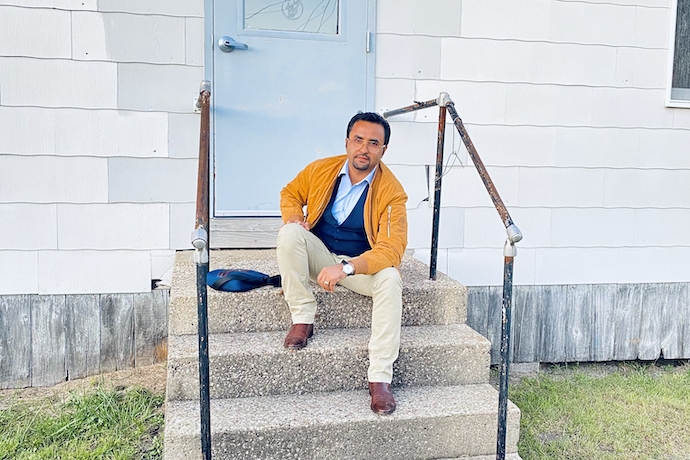The Platform
Latest Articles
by Mohammad Ibrahim Fheili
by Abidemi Alade
by Sheiknor Qassim
by Theo Casablanca
by Vince Hooper
by Samita Sajeevan
by James Carlini
by Sheiknor Qassim
by Samudrala VK
10
Restructuring Lebanon’s Banking Sector: A Roadmap to Regain Trust, Fairness, and Financial Stability
by Mohammad Ibrahim Fheili
by Mohammad Ibrahim Fheili
by Abidemi Alade
by Sheiknor Qassim
by Theo Casablanca
by Vince Hooper
by Samita Sajeevan
by James Carlini
by Sheiknor Qassim
by Samudrala VK
10
Restructuring Lebanon’s Banking Sector: A Roadmap to Regain Trust, Fairness, and Financial Stability
by Mohammad Ibrahim Fheili
Khushnood Nabizada: International Community Must Support Struggling Afghan Media
Since 2001, Afghanistan has witnessed the emergence of a professional and independent media sector. Unfortunately, since the fall of Kabul to the Taliban, independent media in Afghanistan is going through a particularly hard time.
To discuss this, I interviewed Khushnood Nabizada, the founder of Khaama Press, the largest independent news website in Afghanistan. Khaama Press is considered one of the most authentic news sources in Afghanistan and is often quoted by global news websites. Khushnood Nabizada survived an assassination attempt on his life in February when his armored vehicle was targeted in an IED blast in Kabul. Nabizada is currently living in exile at a military base in Wisconsin.
Our conversation, conducted via Skype and edited only for content, is below.
In your view, what are the challenges facing Afghan media outlets?
Media agencies and news outlets in Afghanistan are facing a challenging situation since the fall of [Ashraf] Ghani’s government. Over 150 outlets have already shut down due to a shortage of operating funds and or not being allowed to operate. Dozens of journalists have been detained and tortured since August.
Many of the independent Afghan media agencies that used to collect operating funds from advertisements, subscriptions, and the selling of content to outside businesses and organizations are likely to collapse. The Afghan private sector is dying as the country’s economy is in crisis.
One of the biggest achievements of Afghan civil society in the last two decades has been the emergence of freedom of speech and expression. How do you see it now?
Freedom of speech and many other democratic values are at risk in Afghanistan. Access to information is extremely limited. Journalists are not allowed to cover events nor to report regarding the current situation in the country. There will likely be few journalists and media outlets that are able to survive the Taliban’s rule. There is no reporting on the ground in cities, districts, and rural areas.
As a member of the journalism community, I am very much concerned about the future of the press and freedom of speech in Afghanistan.

How can the international community safeguard Afghan media?
At this critical time, Afghan media needs the support of the international community. The empowerment of media in Afghanistan is in fact the shared achievement of the global community and international organizations. Losing these achievements will not only be a loss for Afghanistan but to all those countries that claim to support democracy and freedom.
Is Khaama Press facing any issues with its operations?
Yes, it is facing a financial crisis, lack of technical expertise, and professional journalists on the ground, with little to no access to information. We are reporting with very limited resources. Many of our journalists cannot reflect what is actually happening on the ground as there is no competent authority to support them.
What is the future of Khaama Press?
Khaama Press, an 11-year-old news agency, is also passing through a tough time and it has hardly managed to keep its services live since the Taliban returned to power in August. All our funding sources have stopped and our business contracts have been canceled. Many of our journalists, experts, and professional staff have already fled the country, seeking asylum in Europe, the U.S., or Canada.
As I expressed my concerns earlier, if the situation does not change, Khaama Press may collapse. Also, an organization that has been established and incorporated with the investment of a huge sum of dollars, time, and efforts of a committed and professional team of journalists and editors is fighting for its survival.
I am committed to trying my best to find a solution to avoid Khaama Press’ collapse. I am looking for opportunities of stationing Khaama Press outside Afghanistan.
How can Afghan media maintain its independence?
It is hard and challenging for any independent media in Afghanistan to continue its operations from inside the country. The only way I foresee for Afghan independent media to survive is to move the head offices, editorial and operational units to other countries and only keep a small team of reporters inside the country.
Manish Rai is a geopolitical analyst and columnist for the Middle East and Af-Pak region. He has done reporting from Jordon, Iran, and Afghanistan. His work has been quoted in the British Parliament.